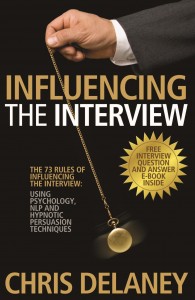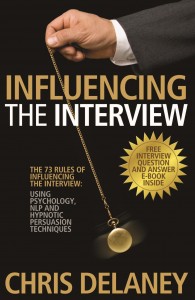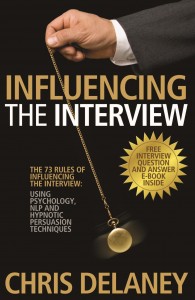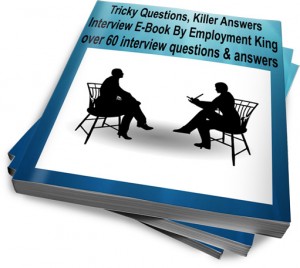How to Change the Interviewers Opinion of You.
A client came to see because when he attended his last interview, he got the impression that from the start of the interview the employer had a negative opinion about him. In these situations, you have the disadvantage of the employer filtering all your interview answers through a ‘negative filter’ which generally creates a stronger negative view of you, which means you first need to change the employer opinion of you by breaking down their belief regarding you.
These filters happen in everyday life, remember back to a past relationship, when you meet someone who you initially like and this person has a habit that you might say is “cute” as you are filtering this information through a positive filter. After a while, you realise that this person is not for you, as they continue you do their habit you filter this through a negative filter and this once cute habit now really annoys you.
You can learn to breakdown a person belief system through ‘conversational change’ or what we call in NLP as ‘slight of mouth patterns.’ Below you find 14 slight of mouth patterns and examples of how to word them in a job interview setting. These suggestions are design with the examples of negative beliefs we have recorded below in mind, which means it more important to understand the patterns so you can apply them to your own interview situation.
Change the employer’s opinion
People’s beliefs are created through a variety of things including their past experience, their state and their generalisations. Beliefs can come in the form of:
- 1. Complex equivalence (A “means” B)
“Everyone who works at company X is lazy” (complex equivalence)
- 2. Cause-effect (A “causes ” B).
“If you’re under 40 you don’t have the required knowledge or experience need for this position” (cause and effect)
Sleight of Mouth Pattern Examples
Redefine; change the representation of the belief
- What other meaning could the equation have?
Example SOMP Question or Statement: so what you mean is, that because I want to leave company X I’m a hard worker?
Consequence; consequences that can change beliefs
- What will happen to them if they continue to think this way?
Example SOMP Question or Statement: if you believe that, you might miss out on some top rate employees who may be an exception to the rule
Intention; what is the positive intention?
- Why are they saying this?
- What is the secondary gain?
- What are they trying to get?
Example SOMP Question or Statement: I agree, sometimes older employees are more experienced, but I have been specialising in this area all my life and I am the only one who knows how to implement X
Chunk Down; specific elements
- What specifically?
- What are examples of this?
- What are parts of this?
Example SOMP Question or Statement: what do you need to hear that will convince you I have the knowledge you require?
Chunk Up; generalisations
- For what purpose?
- What’s important about this?
- Exaggerate.
Example SOMP Question or Statement: its not that the workers are lazy there just managed wrong
Counter Example; exceptions that challenge generalization
- Invert the belief.
- Make into a universal statement or question
- A causes B, not B causes not A.
Example SOMP Question or Statement: we have all met people old and young who surprise us
Another Outcome; propose a different outcome
- What is another outcome you could shift to?
Example SOMP Question or Statement: if you invested in me as a person with my strong work ethics, you would see a big monetary return
Metaphor/Analogy; Use an analogy or metaphor that challenges the generalization defined by the belief
- What story will relate to their belief?
- Tell a metaphor or story about the solution.
Example SOMP Question or Statement: my current manager said he took a chance employing me as I was new to the industry, but he said he seen something in me and know he rates me as his number one performing employee.
Apply to Self; use key aspects of the belief to change the belief
- Don’t think about it; just use the word back on itself.
Example SOMP Question or Statement: “You don’t have the required knowledge or experience need for this position, unless you’re passionate about this sector, no matter if your 40, 30 or 50”
Hierarchy of Criteria (Values) Re-assess the belief based on a more important criterion.
- What is a higher criteria (values)?
- Apply current criterion (value) to current sentence.
Example SOMP Question or Statement: isn’t it more important to think about what value I can add to the organisation then how old I am
Change Frame Size; Re-evaluate the implication of the belief in the context of a longer (or shorter) time frame, a larger or shorter number of people (or from an individual point of view) or a bigger or smaller perspective.
- Something (larger or smaller) they haven’t noticed.
- Different frame, same behaviour.
- Chunk up to Universal Quantifier.
Example SOMP Question or Statement: employing a younger member of staff will mean that the older employees will want to work harder to seem just as enthusiastic
Meta Frame; change the basis of the belief
- How is it possible they could believe that?
Example SOMP Question or Statement: you can’t employee some on their age alone, but you can employ someone or their knowledge and skill base, especially when I have evidence to back this up
Model of the World; look at the belief from a different perspective
- Switch Referential Index.
- Is this true in everyone’s Model of the World?
Example SOMP Question or Statement: if you were interviewing the you at my age, would you employ him?
Reality Strategy; Re-assess the belief based on the fact that beliefs are based on specific perceptions
- How do they represent that belief?
- How do they/you know if it’s not true?
- Apply current criterion (value) to current sentence.
Example SOMP Question or Statement: how do you know that all people from company X are lazy and not just the few of them you have met?
In the new book ‘Influencing the Interview’ you will learn several new ways of getting out of tricky interview situations and you will also learn how to use hypnotic interview language to secure more job offers.
If you enjoyed this article you will also enjoy reading:










